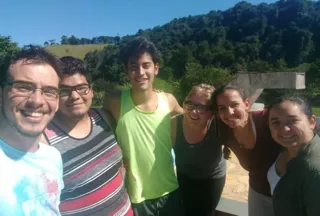Summer Scholar Elizabeth Flores '19 Honored for Biology Research

Guillermo Barreto Corona '19 (second from left), Jordan Reyes '19 (third from left), Assistant Professor of Conservation Biology Liz Nichols (fourth from left), and Elizabeth Flores '19 (far right) with BENS group members in Brazil.
Elizabeth Flores ’19 left the Society for Advancement of Chicanos/Hispanics and Native Americans in Science (SACNAS) conference this fall with a “best poster” award. But her real prize was personal.
“It was a phenomenal experience to see and meet people who looked like me talking about science,” says Flores, a biology and educational studies special major from Pomona, Calif., who along with two classmates who also presented at SACNAS belongs to the inaugural 2015 cohort of Swarthmore’s Summer Scholars Program.
“The amount of love in the room was really hard to explain, but there must have been three or four talks for which I found myself tearing up or crying because of the similarity of our backgrounds,” Flores says. “To see how successful a lot of these people were, not only academically or vocationally but also just emotionally good and happy, was very inspirational.”
Flores’ poster, “Dung Beetle — Fecal Parasite Interaction Networks Across a Deforestation Gradient,” as well as her command of the research and communications skills earned her a student presentation award. The judges from the conference, focused on national diversity in STEM and held in October in Salt Lake City, Utah, commended and congratulated her on the final day.
Flores conducted her research while working with Assistant Professor of Conservation Biology Liz Nichols’ Biodiversity and Environmental Sustainability group (BENS). The BENS group explores the consequences of global environment change for biodiversity and environmental sustainability.
Through a BENS group collaboration with the University of São Paulo, Flores analyzed previously collected data on Brazilian dung beetles and their parasites to examine how the patterns of dung beetles-parasite interaction networks changed with deforestation. She found that in heavily deforested landscapes, even different dung beetle species were heavily, and similarly, infected with a distinct set of parasites than those found in more forested landscapes.
Joined by fellow Swarthmore Summer Scholar Jordan Reyes '19, a biology major from El Paso, Tex., and Guillermo Barreto Corona '19, a biology and computer science major from Bellevue, Wash., Flores also dissected over 1,000 dung beetles for a genomic study underway in the BENS group in São Paulo.
Reflecting on her experience, Flores says the project helped develop her identity as a scientist.
“Liz gave us the guidance we needed, but at the same time was good at pushing us to a level where we felt uncomfortable intellectually but not incapable,” says Flores, who received the James H. Scheuer Summer Internship in Environmental Studies for 2017 and support from the Dean's Office and Sigma XI to attend SACNAS.
“It was that discomfort I felt at times that motivated me to learn something new,” she adds, “and to be creative or imaginative with what I was doing.”
In July Flores, Barreto Corona, and Reyes also presented different elements of the BENS group's work at the Association of Tropical Biology and Conservation (ATBC) annual meeting in Yucatán, Mexico. Aside from the Swatties being the only three undergraduates to present, the meeting was special for Flores because it was her first visit to her family’s homeland of Mexico.
“I’ve been so close to it, living in California,” says Flores. “But finally getting there was an identity-rich experience.”
This was Flores’ second summer of research with biology faculty. In 2016, she collaborated with Elizabeth Vallen, professor and department chair, cell biology, on microbiology research, through the Surdna Summer Research Fellowship. Flores then took a conservation biology class with Nichols, thinking, “If what she’s doing in her lab is anything like what she’s teaching in class, I’ve got to get on that team.”
That decision paved her way to SACNAS, a society of scientists dedicated to fostering the attainment of advanced degrees, careers, and positions of leadership in science for Chicano/Hispanic and Native American college students and professionals. This year, the conference brought together more than 4,000 students and professionals; among them, Swarthmore Summer Scholars Jesus Hernandez '19, an engineering major from Granada Hills, Calif., who discussed setting the foundation for swarm robots to be able to navigate toward targets and avoid obstacles in variable outdoor conditions, and Jonathan Tostado-Marquez '19, a mathematics and film & media studies major from Pomona, Calif., who presented "Failed Power Domination" in the field of graph theory.
“It was nerve-wracking to see that many people there all in one place,” says Flores. “But I was pretty determined to give it my all. I loved what I had worked on, and the judges told me it showed how much I liked talking about it.”
Swarthmore is investing in its vibrant intellectual culture. Learn how at lifechanging.swarthmore.edu.



